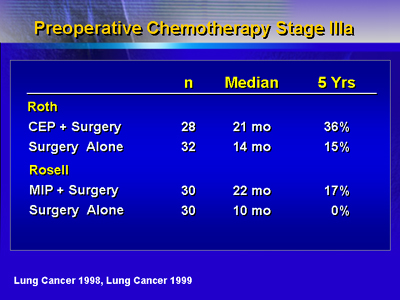|
Surgery continues to offer the best hope for cure for patients who have early-stage non-small cell lung cancer (NSCLC). However, prognosis remains suboptimal, even with complete surgical resection. Investigators have explored numerous radiation and chemotherapy strategies to improve survival and other outcomes, including radiation therapy and chemotherapy. Results to date have not clearly established a role for use of multiple treatment modalities in early-stage NSCLC.
Numerous clinical trials conducted over the past two decades have yet to define a clear role for combined-modality therapy in patients who have early-stage (l /ll) NSCLC. Indications for radiation therapy and chemotherapy remain equivocal in both the preoperative and postoperative settings.
Most studies of postoperative radiation have involved too few patients to identify potential small clinically relevant benefits. One meta-analysis of 9 clinical trials involving more than 2,000 patients showed a detrimental effect of postoperative radiation therapy on survival, particularly in patients who had early-stage disease. Critics of the analysis noted that the trials used outdated radiation therapy techniques. Modern clinical series have not demonstrated an increased mortality risk.
Studies of postoperative (adjuvant) chemotherapy also have demonstrated no clear survival benefit for patients who have early stage lung cancer. A meta-analysis of clinical trials involving 1,400 patients of postoperative cisplatin showed an absolute mortality benefit of 5% at 5 years. The absolute difference translated into a 13% reduction in relative risk over 5 years.
Overall, clinical trials of preoperative irradiation have shown no improvement in resection rates or survival. The only apparent role for preoperative irradiation is for patients who have superior sulcus tumors.
In contrast preoperative chemotherapy has shown some potential to improve survival and other outcomes for patients with Stage lll NSCLC. Two randomized controlled trials of preoperative chemotherapy published in the late 1990s showed statistically significant improvement in median and long-term survival.

Many of the trials of preoperative chemotherapy in Stage l and ll have involved few patients. Several large, randomized, controlled trials have begun and should clarify the role of preoperative chemotherapy in the treatment of this subset of patients with early-stage NSCLC.
|